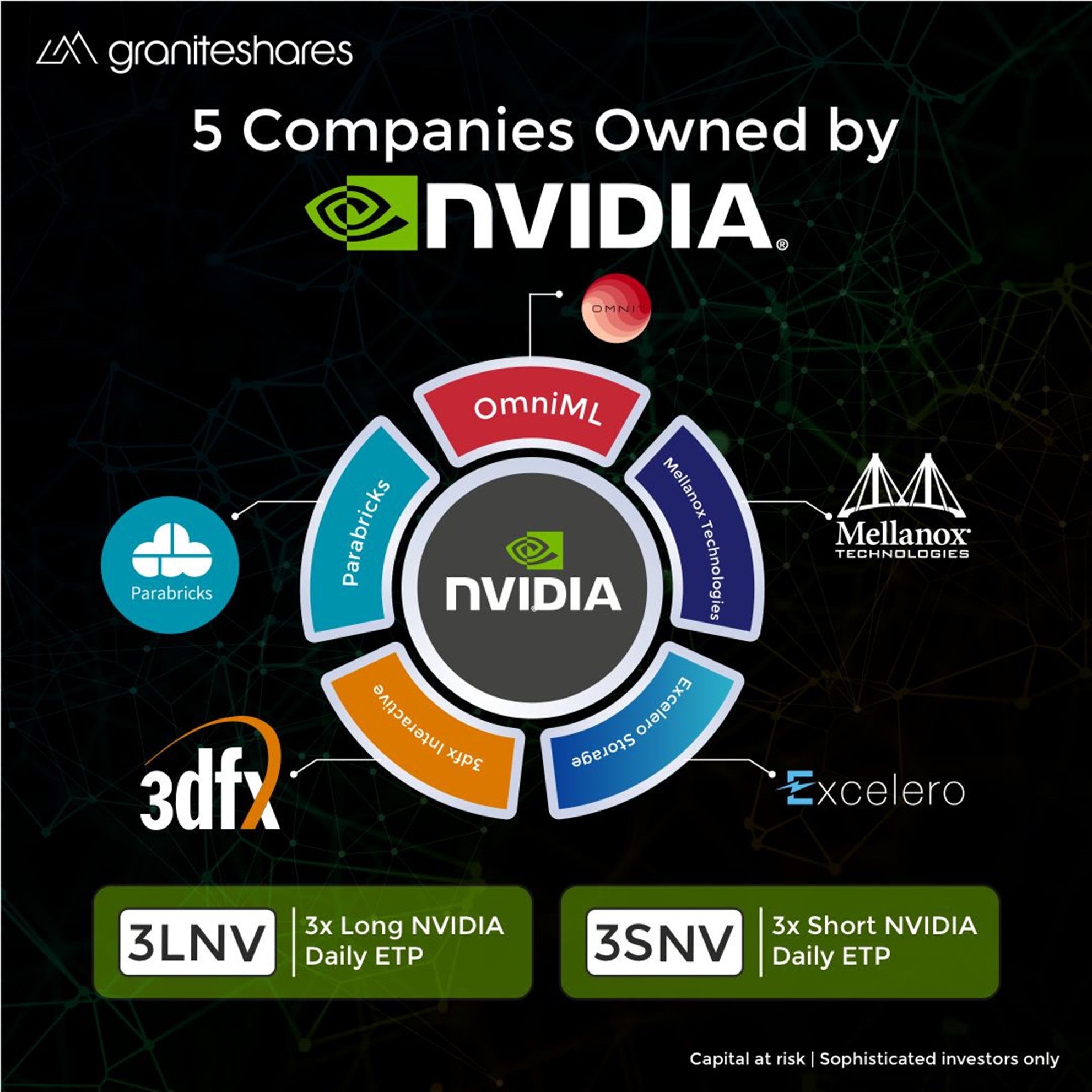Five Companies Owned by Nvidia
Posted:
Nvidia (NASDAQ: NVDA) is the world's largest semiconductor company, and considering it just surpassed a $2.2 trillion valuation, making it America's third most valuable companies by market cap behind Microsoft and Apple.
Most of Nvidia's market capitalization has been added in the last 12 months alone, thanks entirely to its data center chips designed to process artificial intelligence (AI) workloads. CEO Jensen Huang is often referred to as the "Godfather of AI" by Wall Street analysts, and now he's spreading his company's good fortune by investing in other AI stocks.
Nvidia's graphics processing units (GPUs) are the top choice for developers focused on building, training, and deploying artificial intelligence (AI) technologies. This led to a significant 217% increase in the company's data center revenue in fiscal 2024 (which ended on January 31).
While Nvidia's growth has largely been organic, acquisitions have also significantly contributed to its expanding semiconductor empire. Although no single acquisition has been crucial in defining its growth (the $40 billion deal for Arm Holdings (ARM -3.43%) was blocked by regulators), Nvidia has acquired numerous smaller companies throughout its history. More recently, it has garnered attention for acquiring minority stakes in several promising AI companies.
Company Overview
Nvidia headquartered in santa clara california, a leader in the tech industry, is known for its pioneering developments in graphics processing units (GPUs) and artificial intelligence (AI). Founded in 1993, Nvidia has continually advanced computing technology, impacting sectors such as gaming, professional visualization, data centers, and autonomous vehicles.
To fuel its growth, Nvidia has strategically acquired several companies, each enhancing and broadening its technological capabilities. These acquisitions not only bolster Nvidia’s current offerings but also pave the way for new innovations and market opportunities. This article delves into five significant companies acquired by Nvidia, illustrating how each has strengthened Nvidia’s position as a technological front-runner.
Five Companies Owned by Nvidia
- OmniML, 2022
Nvidia's latest acquisition is the AI startup OmniML, known for its technology that miniaturizes machine learning applications, enabling them to run on edge devices like computers and smartphones. Interestingly, Nvidia did not publicly announce this acquisition, possibly to avoid drawing attention.
In 2022, OmniML launched the Omnimizer platform, which adapts computationally intensive AI models for lower-end hardware. This model-shrinking technology attracted Nvidia, leading to its acquisition of OmniML in February of 2023.
NVIDIA's edge offerings include the NVIDIA EGX platform for enterprise edge computing, the IGX platform for industrial applications, and Jetson for autonomous machines and embedded edge use-cases. These platforms, supported by optimized NVIDIA software and the Fleet Command platform for managing edge fleets, are now bolstered by the Omnimizer platform.
Omnimizer's automated model optimization techniques will enhance NVIDIA’s edge strategy by making models more efficient and capable, fitting larger models on smaller devices and tailoring them for edge performance.
OmniML’s technology also allows NVIDIA to create custom profiles for its hardware, ensuring optimal use of edge hardware. The NVIDIA GPU Cloud (NGC) Catalog, offering GPU-optimized software containers for enterprises, will greatly benefit from OmniML's optimization techniques.
This integration will provide significant performance and efficiency gains for edge models and ensure a well-fitted solution architecture for various hardware configurations. The acquisition of OmniML strengthens NVIDIA’s leadership in the AI market, offering unique value that cements its position in edge AI.
- Mellanox Technologies, 2019
Mellanox Technologies, a leader in high-performance networking solutions, specializes in products that facilitate efficient data transfer in data centers, cloud computing, and storage environments. The company is known for its InfiniBand and Ethernet products, which are essential for high-speed data interconnectivity.
Nvidia acquired Mellanox Technologies in March 2019 for approximately $6.9 billion. This acquisition marked one of the largest deals in Nvidia’s history and was a significant strategic move to enhance its data center capabilities.
The acquisition of Mellanox was pivotal for Nvidia as it aimed to strengthen its data center and high-performance computing (HPC) offerings. Mellanox’s technology complements Nvidia’s GPUs, providing a comprehensive solution for data-intensive applications. This synergy is particularly crucial for AI, machine learning, and large-scale data analytics, where efficient data transfer and processing speed are paramount.
Impact:
Integrating Mellanox’s high-performance networking solutions has significantly boosted Nvidia’s data center revenue and market presence. It has allowed Nvidia to offer end-to-end solutions that combine computing and networking, thereby enhancing performance and efficiency for customers. This acquisition has positioned Nvidia as a more formidable player in the data center market, driving substantial growth and innovation in its product lines.
- Excelero Storage, 2022
In March 2022, Nvidia acquired Excelero, an Israeli company founded in 2014 that specializes in high-performance storage solutions. Excelero's flagship product, NVMesh, offers scalable and low-latency storage. This acquisition has enhanced Nvidia's AI and high-performance computing (HPC) capabilities. Given Excelero's long-standing partnership with Nvidia, the acquisition was a logical step.
Nvidia planned to leverage Excelero's expertise by integrating its technology into its enterprise software stack. This integration aims to enhance Nvidia's data storage and processing products, with specific applications for Excelero-style block storage in supporting its high-performance computing (HPC) clusters and its DOCA software framework, which operates on Nvidia's BlueField data processing units (DPUs).
- 3dfx Interactive, 2000
3dfx was a graphics technology company that provided chips, boards, and software for video games, educational content, and business applications. Despite being a leading company in the late 1990s, 3dfx struggled due to declining customer reviews and delayed product releases.
In 2000, Nvidia, as part of a larger industry consolidation, announced it would acquire most of 3dfx's assets, including patents, brand names, and inventory related to its graphics chip business. Nvidia also loaned 3dfx money for working capital to support its remaining operations. However, by October 2002, 3dfx's remaining businesses filed for bankruptcy protection.
According to the agreement, Nvidia will provide 3dfx with $70 million in cash and 1 million shares of common stock in exchange for the patents, brand names, and existing inventory associated with 3dfx's graphics chip business.
- Parabricks, 2020
Parabricks is a company specializing in GPU-accelerated genomic analysis software, catering to researchers and healthcare professionals processing large-scale genetic datasets. Nvidia's acquisition of Parabricks in October 2020 underscores its commitment to leveraging GPU technology for accelerating computational workloads in healthcare. By integrating Parabricks' optimized software into its ecosystem, Nvidia aims to advance precision medicine, drug discovery, and genetic research, offering substantial speed improvements over traditional CPU-based methods.
The acquisition strengthens Nvidia's presence in the healthcare and life sciences sectors, addressing the growing demand for high-performance computing solutions in genomics and personalized medicine. By offering GPU-accelerated genomic analysis software, Nvidia enhances its portfolio of AI-driven healthcare solutions, empowering researchers and clinicians with faster and more accurate genomic analysis capabilities, ultimately contributing to advancements in healthcare technology and patient care.
Top 5 Artificial Inteligence (AI) Stocks Nvidia invested
Nvidia recently bought 5 artificial intelligence (AI) stocks.
- Arm Holdings, 2023
Stake: 0.2% ownership
Nvidia's attempt to acquire chipmaker Arm Holdings in 2020 faced regulatory hurdles, resulting in the deal being blocked. Despite this setback, Nvidia and Arm have maintained a close partnership, with Nvidia licensing Arm's architecture for products such as the Grace Hopper H200 Superchip.
Arm is renowned for its energy-efficient CPUs, which consume less power compared to competitors like Intel's x86 or AMD's processors. This efficiency has led to Arm's dominance in the smartphone market, with its architecture powering 99% of smartphones worldwide. Additionally, Arm's architecture is highly valued for running AI applications in data centers, where power consumption is a critical concern.
Nvidia invested in Arm and currently has a 0.2% stake in the company.
- Soundhound AI, 2023
Stake: 0.6% ownership
Nvidia's 13-F filing in February 2024 revealed investments in various AI stocks, including Soundhound AI, known for its audio AI technology enabling tasks such as speech recognition, text-to-speech, and song identification.
Although Nvidia initially invested $1.73 million in Soundhound in the fourth quarter, the value of this investment has since risen significantly. While Soundhound primarily focuses on consumer-facing AI applications, direct collaboration between the two companies may not be immediate. However, Nvidia could explore new market opportunities where Soundhound's technology could be leveraged.
SoundHound AI, with a valuation of $2.5 billion, is smaller compared to Arm, yet it holds significant potential due to its conversational AI technology. This technology enables voice recognition and interactive responses, making it versatile in various applications.
- Nano-X Imaging, 2023
Stake: 0.1% ownership
Nano-X Imaging focuses on developing affordable and accessible digital X-ray and medical imaging sources. Its flagship product, the Nanox.ARC, aims to revolutionize conventional X-rays. Nvidia disclosed a 0.1% stake in Nano-X, acquired indirectly through its venture fund's 2017 investment in Zebra Medical, which Nano-X bought in 2021. Retaining this stake signals Nvidia's endorsement of Nano-X, whose AI capabilities were boosted by acquiring Zebra Medical.
- Recursion Pharmaceuticals, 2023
Stake: 3.4% ownership
In July 2023, Nvidia invested $50 million in Recursion Pharmaceuticals (RXRX -2.76%), a biotech firm using AI for drug discovery. This led Recursion's stock to jump 80%, viewed as an endorsement from Nvidia. The companies will collaborate to train Recursion's AI models on Nvidia's cloud platform, with these models available on Nvidia's BioNeMo drug discovery engine. Nvidia's growing focus on healthcare, particularly drug discovery, suggests potential for further collaborations or investments.
- TuSimple Holdings
Nvidia announced that it has partnered with TuSimple to utilize Nvidia's vehicle chips in designing and building an advanced autonomous driving technologies for the trucking industry.
Bottom Line
These acquisitions collectively enhance Nvidia's technological capabilities and market reach, solidifying its leadership across various high-tech sectors.
Sources:
NVIDIA ETPs by GraniteShares
| Product name | Ticker | ||
|---|---|---|---|
| USD | EUR | GBX | |
DISCLAIMER
Please note that GraniteShares' short and leveraged Exchange Traded Products are suitable only for sophisticated investors.
This is a disclaimer stating that all trading and investing comes with risks. Always do your research and do not invest more than you can afford to spend.
GraniteShares accepts no responsibility for any loss or damage resulting directly or indirectly from the use of this blog or the contents.
This blog does not constitute an offer to buy or sell or a solicitation of an offer to buy securities in any company. Nothing contained herein constitutes investment, legal, tax or other advice nor is to be relied upon in making an investment or other decision. No recommendation is made positive or otherwise, regarding individual securities or investments mentioned herein. Any summary list of risk factors does not purport to be a complete enumeration or explanation of the risks involved in a particular investment. Prospective clients must consult with their own legal, tax and financial advisers before deciding to invest. This email contains the opinions of the author and such opinions are subject to change without notice. The source of data is GraniteShares unless otherwise stated. No guarantee is made to the accuracy of the information provided which has been obtained from sources believed to be reliable. This email and the information contained herein is intended only for the use of persons (or entities they represent) to whom it has been provided. Past performance is not a reliable indicator of future results. The value of an investment may go down as well as up and can result in losses, up to and including a total loss of the amount initially invested. Investments may involve numerous risks including, among others, company risks, general market risks, credit risks, foreign exchange risks, interest rate risks, geopolitical risks and liquidity risks. Please note that GraniteShares short and leveraged Exchange Traded Products are for sophisticated investors.


